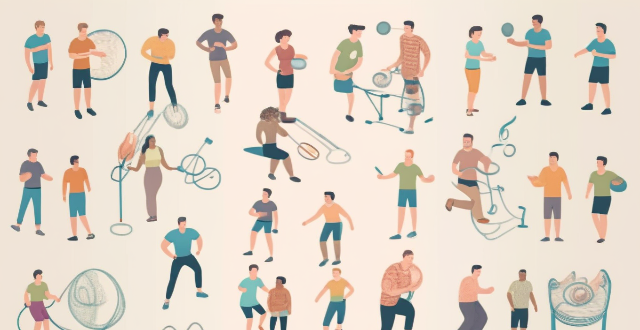Athletes employ various strategies to cope with mental stress during competitions, including visualization and imagery, breathing techniques, goal setting, social support, mindfulness and meditation, professional help, and maintaining healthy lifestyle habits. These methods range from mental preparation techniques to seeking professional guidance and engaging in leisure activities for relaxation and enjoyment. By incorporating these strategies into their routines, athletes are better equipped to handle the psychological demands of competition.

Coping with Mental Stress in Sports
Athletes often face immense mental stress during competitions. Here's how they cope:
1. Visualization and Imagery
Athletes use visualization techniques to prepare for their events mentally. They imagine themselves performing at their best, which helps build confidence and reduces anxiety.
- Positive Affirmations: Repeating positive statements like "I am strong" or "I can do this."
- Mental Rehearsal: Imagining the entire event, from warm-up to victory.
2. Breathing Techniques
Controlled breathing is a powerful tool to calm the mind and body. Athletes practice deep breathing exercises to reduce tension and focus on the present moment.
- Diaphragmatic Breathing: Inhaling deeply through the diaphragm instead of shallow chest breaths.
- Mindful Breathing: Paying attention to each breath without judgment.
3. Goal Setting
Breaking down goals into manageable steps helps athletes stay focused and motivated. They set realistic expectations for themselves, reducing the pressure of unrealistic standards.
- Short-term Goals: Focusing on immediate tasks rather than distant outcomes.
- Process Goals: Concentrating on what can be controlled, such as effort and technique.
4. Social Support
Having a supportive network of coaches, teammates, family, and friends is crucial for managing stress. Athletes lean on these relationships for encouragement and advice.
- Debriefing: Discussing performance with trusted individuals to gain perspective.
- Emotional Venting: Expressing feelings in a healthy way to release tension.
5. Mindfulness and Meditation
Practicing mindfulness involves being fully present in each moment without judgment. Meditation is a form of mindfulness that helps clear the mind and increase resilience under pressure.
- Body Scan Meditation: Focusing on different parts of the body to become more aware of physical sensations.
- Guided Meditations: Following a recorded meditation to improve concentration and relaxation.
6. Professional Help
When stress becomes overwhelming, athletes seek professional help from sports psychologists or counselors who specialize in performance-related issues.
- Cognitive Behavioral Therapy (CBT): Addressing negative thought patterns that contribute to stress.
- Hypnotherapy: Using hypnosis to access subconscious thoughts affecting performance.
7. Lifestyle Habits
Maintaining a balanced lifestyle outside of sports is essential for overall well-being and stress management.
- Adequate Sleep: Ensuring enough restful sleep for recovery and mental clarity.
- Nutrition: Eating a balanced diet to fuel both physical and mental needs.
- Leisure Activities: Engaging in hobbies unrelated to sports for relaxation and enjoyment.
In conclusion, athletes employ various strategies to cope with mental stress, ranging from mental preparation techniques to seeking professional guidance and maintaining healthy lifestyle habits. By incorporating these methods into their routines, they are better equipped to handle the psychological demands of competition.